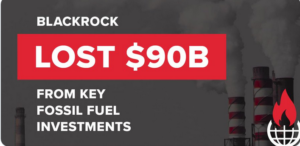
It has the financial muscle that many can only dream of. But that does not make it immune from making mistakes, which are both financially hurting its investors at the same time as hurtling us towards climate chaos.
BlackRock is the world’s largest fund manager, which has nearly US$6.5 trillion of assets under management. To give you some kind of perspective that is bigger in value than the third largest economy in the world, Japan.
BlackRock may be wealthy, but that does not make it wise. It is also riddled to the core with conflicts of interest that must blur its vision to the detriment of those people who place their money and trust in the company.
For years, groups like Oil Change International, Carbon Tracker, and many others, have warned about the risk that oil and gas reserves will become stranded assets made worthless as the world switches to a low carbon future.
In more recent times, The Bank of England, the Intergovernmental Panel on Climate Change (IPCC) and others have repeatedly highlighted the growing magnitude of climate risks to financial markets.
It seems BlackRock is not listening. A new report by the Institute for Energy Economics and Financial Analysis (IEEFA), has found that BlackRock “continues to ignore the serious financial risks of putting money into fossil fuel-dependent companies.”
The IEEFA calculated that, due to BlackRock’s continuing investments in fossil fuels, there has been a whopping US$90 billion in value destruction and opportunity cost of the fund managers investments. And according to the IEEFA, “this represents just the tip of the iceberg.”
One of the most staggering conclusions is BlackRock’s continued belligerent investment in Big Oil, despite the fledgling renewable revolution and growing climate crisis.
As the report notes: “Out of BlackRock’s US$90 billion in estimated losses, 75% are due to its investments in four companies alone – ExxonMobil, Chevron, Royal Dutch Shell and BP – which have all underperformed the market in the past decade.”
To make it worse, BlackRock likes you to think its green. In May 2018, BlackRock Vice Chair Philipp Hildebrand led a detailed study that called sustainable investing a “why-not moment.” In April 2019, BlackRock’s called Climate risk “Clear, Present and Underpriced.”
However, despite its public pronouncements, only 0.8% of its total portfolio is invested in environmental, social, and governance oriented funds.
Trying to justify its financial failure, BlackRock apparently maintains it has little control over its US$4.3 trillion “passively” managed portfolio.
The report debunks BlackRock’s position, arguing that: “leading peers such as Amundi, Norges Bank, AP4, Storebrand and KLP have all developed low-carbon investing strategies that provide at least comparable risk-adjusted returns in a cost-effective sustainable way, as expected of leading asset managers providing leadership and creating suitable, risk-protected products.”
Maybe BlackRock’s “myopic” fossil fuel strategy is due to its conflicts of interest on the board. Six out of its 18 board members have worked in companies with strong ties to the fossil fuel sector.
Tim Buckley, IEEFA Director of Energy Finance Studies and a former head of equity research at Citigroup, co-author of the report, says BlackRock “has the power to lead globally to address climate risk, yet to-date it remains a laggard.”
Tom Sanzillo, IEEFA co-author of the report and former First Deputy Comptroller of New York State, asks “How many more examples of value destruction will it take, how many more years of fossil fuel companies lagging the world markets will it take before Blackrock leads?”
IEEFA is now calling on BlackRock to leverage its unprecedented global financial dominance and demonstrate superior stewardship and help fund the renewable revolution.
Tim Buckley adds: “If BlackRock moves [on climate change], everyone else in the market will stand up and listen.”
And there is no time to lose.
The news this morning is that the record-shattering heatwave that boiled Europe last month was made significantly more likely due to human-driven climate change, according to new data from the World Meteorological Organization.
Johannes Cullmann, Director of WMO’s Climate and Water Department, said “Such intense and widespread heatwaves carry the signature of man-made climate change. This is consistent with the scientific finding showing evidence of more frequent, drawn out and intense heat events as greenhouse gas concentrations lead to a rise in global temperatures.”
Announcing the data in New York, UN Secretary-General António Guterres added: “Preventing irreversible climate disruption is the race of our lives, and for our lives. It is a race that we can and must win.”
And for better or worse, BlackRock will help us win or lose that race.

